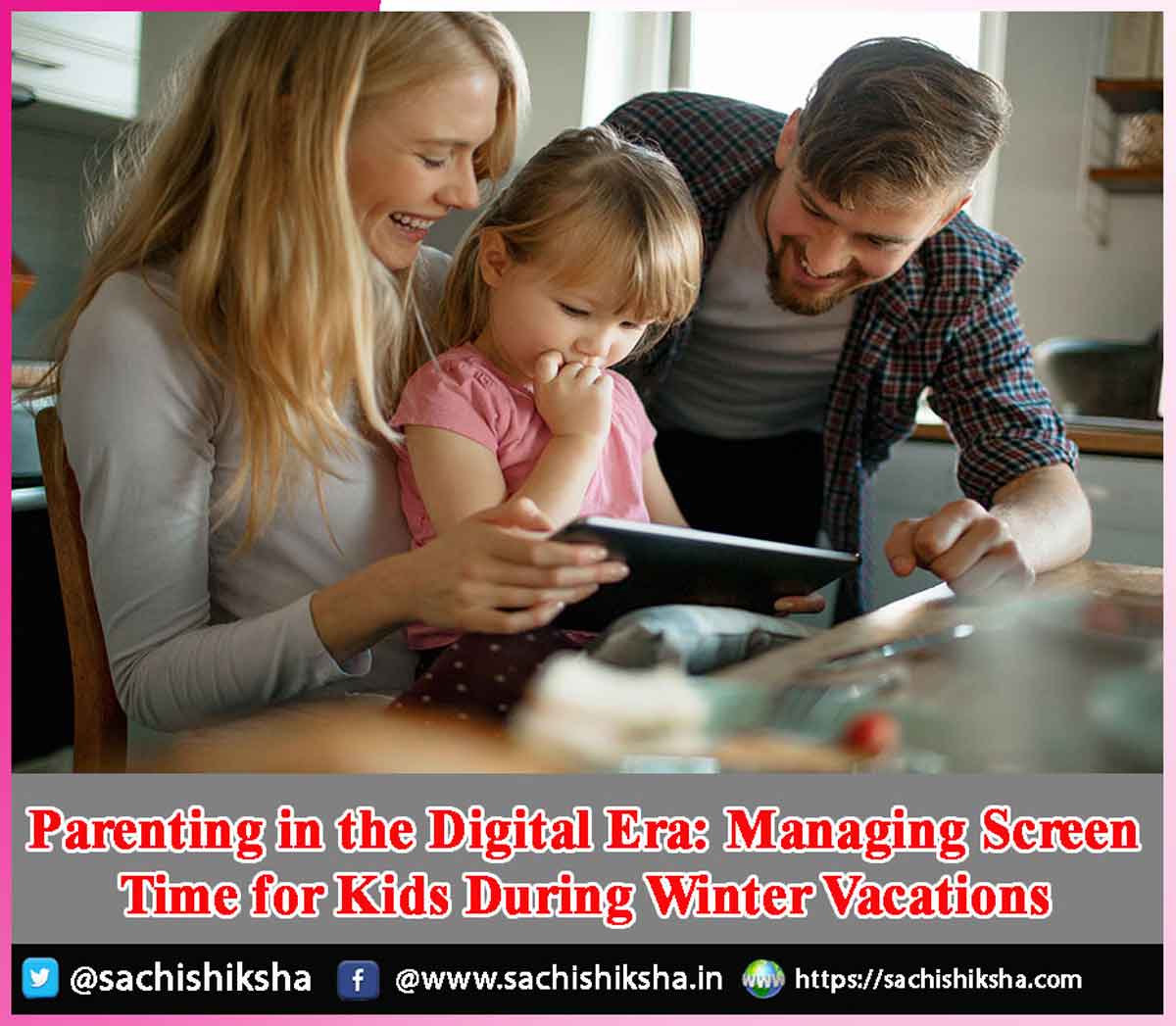Parenting in the Digital Era: Managing Screen Time for Kids During Winter Vacations
Introduction: Winter vacations are often a time of joy and relaxation for both kids and parents. However, in today’s digital era, this break can also present challenges, especially when it comes to managing screen time for children. With technology being a dominant part of daily life, parents often struggle to balance the benefits and risks of screen time, particularly during extended breaks like winter vacations. This article will delve into the importance of managing screen time for kids, the effects of excessive screen use, and practical strategies for parents to foster healthy habits during the winter holidays.
Table of Contents
The Rise of Screen Time in the Digital Age

The Impact of Excessive Screen Time
Before exploring how to manage screen time, it’s essential to understand the potential risks associated with excessive screen use during winter vacations.
Physical Health Concerns:
Spending long hours in front of screens can have several adverse effects on children’s physical health. Most notably, it can lead to:
- Eye Strain and Digital Eye Fatigue: Staring at screens for prolonged periods can cause eye discomfort, headaches, and blurred vision. This is known as “computer vision syndrome.” This condition can result in kids experiencing tired, dry, or itchy eyes.
- Sedentary Lifestyle and Obesity: When children spend more time on screens, they are less likely to engage in physical activities. This sedentary behavior, especially during the winter when outdoor play may be limited, can contribute to weight gain and related health issues.
- Sleep Disruption: The blue light emitted by screens, particularly before bed, interferes with the production of melatonin, a hormone essential for sleep. As a result, excessive screen time, especially in the evening, can disrupt children’s sleep patterns, leading to fatigue, irritability, and difficulty in focusing the next day.
Mental and Emotional Well-Being:
While digital devices can provide educational content and opportunities for social interaction, excessive screen time can also negatively affect children’s mental and emotional health. Some potential issues include:
- Increased Anxiety and Depression: Research has shown that too much screen time, particularly on social media, can contribute to feelings of loneliness, anxiety, and depression in children and teens. Constant exposure to curated images and lifestyles on social platforms can foster unrealistic expectations and low self-esteem.
- Impaired Social Skills: Excessive screen time can limit face-to-face interactions with peers and family members, which are essential for the development of social skills. Kids may become overly reliant on digital communication, struggling to engage in meaningful conversations or form strong personal connections.
- Reduced Attention Span: Studies have suggested that prolonged screen time can contribute to a shorter attention span and difficulty in focusing on tasks that require sustained attention. This is particularly concerning for children’s academic development and future success.
Academic and Cognitive Effects
While many children engage with educational apps and content, spending excessive time on screens can interfere with their cognitive development. The multitasking nature of many digital platforms can cause difficulties with memory, learning, and problem-solving. Furthermore, excessive screen time can lead to a decline in creativity, as children might spend less time engaged in imaginative play or outdoor exploration, which are key drivers of cognitive growth.
Strategies for Managing Screen Time During Winter Vacations
Given the potential risks associated with excessive screen time, parents can take proactive steps to ensure that their children enjoy a balanced winter vacation. Here are several strategies to manage screen time effectively while still allowing children to benefit from technology:
Set Clear Screen Time Limits:
Establishing and enforcing screen time limits is one of the most effective ways to prevent children from overindulging in digital devices. The American Academy of Pediatrics (AAP) recommends that children aged 6 and older should have no more than two hours of recreational screen time per day. During the winter vacation, parents can create a daily screen time schedule, allocating specific time slots for screen use based on the child’s age and individual needs.
To make the process fair and transparent, involve your child in setting these limits. Discuss the importance of balancing screen time with other activities, such as reading, outdoor play, and spending time with family. This collaborative approach helps children understand the reasoning behind the limits, reducing the likelihood of resistance or arguments.
Encourage Alternative Activities:
Winter vacations offer a perfect opportunity to engage children in activities that don’t involve screens. Encourage them to try out different hobbies and interests that promote creativity, physical activity, and social interaction. Some ideas include:
- Arts and Crafts: Set up an arts and crafts station where children can express their creativity through painting, drawing, or making DIY holiday decorations. Crafting can also improve fine motor skills and provide a sense of accomplishment.
- Board Games and Puzzles: Family board games and puzzles can offer hours of entertainment while promoting teamwork, problem-solving, and cognitive development. This is also a great way to bond with your children and foster meaningful conversations.
- Outdoor Play and Exercise: While winter weather can be cold, bundle up and head outdoors for some fresh air and exercise. Activities such as ice skating, sledding, snowball fights, or building a snowman can help children stay active and engage with nature.
- Reading and Storytelling: Create a cozy reading nook and encourage children to dive into books that stimulate their imagination and expand their knowledge. Reading is an excellent alternative to screen time and is essential for brain development.
Use Technology Purposefully
Not all screen time is harmful. In fact, digital tools can be educational and beneficial if used mindfully. Parents can leverage technology to support their children’s learning and development during the winter vacation. Some strategies include:
- Educational Apps and Websites: There are numerous apps and websites that provide interactive learning experiences, covering topics such as math, science, and language development. Encourage children to engage with educational content that enhances their knowledge and skills.
- Virtual Family Activities: If weather conditions or other factors limit outdoor activities, consider hosting virtual family game nights or video calls with extended family members. This allows children to stay socially connected while still engaging in screen time responsibly.
Be a Role Model
Children often mimic the behavior they see in their parents. If you want your kids to reduce their screen time, it’s essential to set a positive example. Try to limit your own screen use, especially when spending time with your child. Create screen-free zones, such as during family meals or before bedtime, and prioritize face-to-face interactions.
Create Screen-Free Zones and Times
Designate certain areas of the house, such as the dining room or bedrooms, as screen-free zones. Additionally, establish screen-free times, such as during family meals or before bedtime. This helps children understand that screens should not be the center of attention at all times, fostering healthier habits.
Conclusion
Managing screen time for children during winter vacations requires a thoughtful and balanced approach. While digital devices can provide entertainment and educational opportunities, excessive use can negatively impact children’s physical, mental, and emotional well-being. By setting clear limits, encouraging alternative activities, using technology purposefully, and being a positive role model, parents can ensure their children make the most of their winter break while maintaining a healthy balance between screen time and other enriching activities. Ultimately, fostering a healthy relationship with technology will benefit children not only during winter vacations but throughout their lives.















































